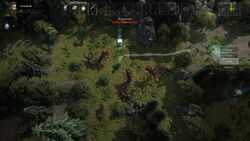On the birth of Dungeons and Dragons
On the birth of Dungeons and Dragons
Editorial - posted by VentilatorOfDoom on Wed 1 August 2018, 11:17:17
Tags: Dungeons & Dragons; Gary GygaxA couple days ago DnD Beyond penned a retrospective on the birth of Dungeons and Dragons, in memory of Gary Gygax (PBUH) who's rolling the dice in Sigil right now or on whatever plane of existence he ended up on.
Wait... what? Did this soyboy not just imply that 5th ed. isn't irredeemable garbage but that oldschool nerds are "not normal" and that thanks to their butchering of a once splendid system the game can now be enjoyed by "normal" people, i.e. idiots? I don't even...
One more excerpt:
On this day, we celebrate the birth of the founder of our hobby, and look back at the story of its creation. Where did D&D come from? What inspired Gygax and Arneson to create this game that has become not just a hobby but a lifestyle for so many people? Could they have possibly anticipated the success of the fifth edition of their game, or that it would ever become a mainstream sensation that attracts not just Hollywood actors, but millions upon millions of normal people like you and me to play this game, and even broadcast their gameplay online for others’ enjoyment?
Wait... what? Did this soyboy not just imply that 5th ed. isn't irredeemable garbage but that oldschool nerds are "not normal" and that thanks to their butchering of a once splendid system the game can now be enjoyed by "normal" people, i.e. idiots? I don't even...
One more excerpt:
TSR released a new edition of Dungeons & Dragons in 1977. In fact, two new editions were being created at once. One was J. Eric Holmes’s Dungeons & Dragons Basic Set, which was essentially a cohesive and unified revision of the game created by Gygax and Arneson. The second, known as Advanced Dungeons & Dragons (AD&D), was produced by Gygax himself. AD&D was separated into four hardcover books: the Player’s Handbook, Monster Manual, and Dungeon Master’s Guide—a tradition that has been replicated by AD&D’s descendants for decades—plus a final book, Deities and Demigods. As Gygax’s creation, AD&D went on to become the “official” version of D&D. It received a 2nd edition in 1987, and by the time its 3rd edition was produced by Wizards of the Coast in 2000, it was so ubiquitous that AD&D was simply known as “Dungeons & Dragons.”
As this new edition was made following Arneson’s departure from TSR, Gygax declared the game his own creation and excluded Arneson from any royalties related to AD&D as a separate entity from the original Gygax & Arneson D&D books. Arneson sued TSR in 1979. While he emerged victorious, the lawsuit over AD&D (and a second lawsuit over the AD&D Monster Manual II) ended the partnership between Gygax and Arneson for good.
The story of Gygax and Arneson ultimately ended in tragedy for both men. Brian Blume’s brother, Kevin Blume, became the new COO of TSR by buying out his father’s stock, and dozens of TSR employees were laid off in the wake of his ascension. Some voiced support for Arneson and disdain for Gygax and the Blumes, but the Blumes were no friends of Gygax’s, either. In 1982, Kevin Blume forced Gygax to step down from TSR’s board and supplanted him as CEO. Gygax remained with TSR for the next 3 years, but his influence over the company only waned—with a brief but glorious resurgence in 1985 with the release of Unearthed Arcana and other major hardcover books—until he finally left TSR, defeated, on the final day of 1985.
As this new edition was made following Arneson’s departure from TSR, Gygax declared the game his own creation and excluded Arneson from any royalties related to AD&D as a separate entity from the original Gygax & Arneson D&D books. Arneson sued TSR in 1979. While he emerged victorious, the lawsuit over AD&D (and a second lawsuit over the AD&D Monster Manual II) ended the partnership between Gygax and Arneson for good.
The story of Gygax and Arneson ultimately ended in tragedy for both men. Brian Blume’s brother, Kevin Blume, became the new COO of TSR by buying out his father’s stock, and dozens of TSR employees were laid off in the wake of his ascension. Some voiced support for Arneson and disdain for Gygax and the Blumes, but the Blumes were no friends of Gygax’s, either. In 1982, Kevin Blume forced Gygax to step down from TSR’s board and supplanted him as CEO. Gygax remained with TSR for the next 3 years, but his influence over the company only waned—with a brief but glorious resurgence in 1985 with the release of Unearthed Arcana and other major hardcover books—until he finally left TSR, defeated, on the final day of 1985.
There are 27 comments on On the birth of Dungeons and Dragons














